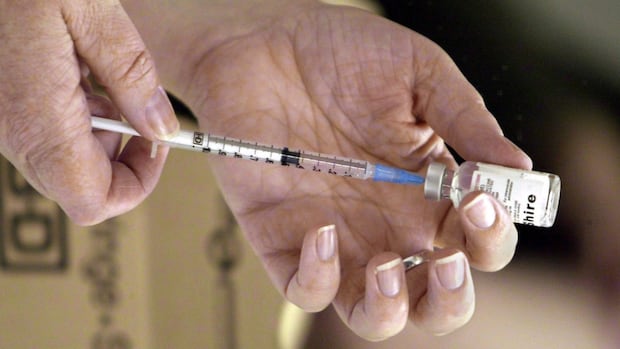[
After decades of progress, childhood vaccination rates have started stalling or falling around the world in recent years, and Canada is not immune to the trend, suggests a new study from The Lancet.
The study estimated the coverage of 11 childhood vaccines in 204 countries and territories between 1980 and 2023, analyzing over 1,000 data sources from around the world.
It found that although globally there were huge strides made in vaccine coverage for children during that period (vaccine coverage against diseases like measles, polio and pertussis more than doubled), progress started stalling, even before the COVID-19 pandemic.

“Particularly in the Americas and high-income countries, between 2010 and 2019, measles vaccine coverage declined in about half the countries,” said Dr. Jonathan Mosser, an assistant professor of health metric sciences at the Institute for Health Metrics and Evaluation at the University of Washington and one of the co-authors of the study.
The pandemic dealt a heavy blow to vaccination rates, with more than 15 million children globally missing routine shots between 2020 and 2023, Mosser said.
The world never fully rebounded to pre-pandemic childhood vaccination levels, he said.
“The pandemic reversed decades of progress that we had in reducing the number of zero-dose children, those children that have never received one of these key childhood vaccines.”
Worsening vaccine inequalities
The pandemic had an outsized impact on regions that already had low vaccine coverage before COVID-19, Mosser said.
Countries in sub-Saharan Africa saw the greatest disruption to vaccine coverage: five to seven million children in the region are estimated to have missed vaccines protecting them against diseases like polio, pneumococcal disease and rotavirus.
“We have challenges related to really long-standing global inequalities and vaccination coverage with many low- and middle-income countries having significantly lower coverage than high-income countries,” Mosser said.
Why vaccination rates have started stalling varies from country to country, he added.
A new study published in the Lancet medical journal suggests childhood vaccinations have stagnated or declined since 2010. The authors say geopolitical instability is fuelling the drop in some countries, but misinformation is largely driving the decline in high-income countries.
“In some places around the world, they’re related to geopolitical instability, they’re related to supply chain issues. In many high-income countries, they’re related to vaccine misinformation and hesitancy,” he said.
Convincing those who won’t get vaccinated
In Canada, Mosser said, vaccine coverage for most shots has dropped compared to the early 2000s. Uptake for some vaccines have fallen over time, like the shot that protects against diphtheria, tetanus and pertussis. Recently there’s been some increases in uptake for other jabs – like the first dose of the measles, mumps and rubella (MMR) vaccine — but the modest increase isn’t enough to prevent outbreaks.
For instance, Mosser said, vaccination rates for measles in 2023 — 92 per cent for one dose of the MMR and 79 per cent for two doses of the MMR — are well below the threshold needed for herd immunity, which is 95 per cent.
In high-income countries like Canada, vaccine misinformation and hesitancy have seriously undermined confidence in vaccines and contributed to lower vaccination coverage, said Mosser.
Another contributing factor could be disparities in coverage, along divides like socioeconomic status, location, race or religion, he added.
“New strategies are needed to encourage people to listen to trusted and reliable voices, including their health-care providers, about vaccination.”
Ontario currently has more measles cases than in all of the U.S. combined, and infections are climbing in Alberta and Manitoba. CBC’s Jennifer Yoon breaks down what’s behind the resurgence of a disease eliminated decades ago, and why those on the front line say it’s going to be really difficult to get this outbreak under control.
In a statement, the Public Health Agency of Canada said it is researching the various and often complex reasons driving vaccine hesitancy across Canada. The agency says it also is developing evidence-based awareness campaigns and resources to support health-care providers encountering vaccine hesitancy.
‘A travelling world’
As public health authorities try to convince those in Canada who won’t get vaccinated, it’s also important to support and fund vaccination campaigns around the world, say experts in Canada.
“The world is a travelling world,” said Dr. Mahli Brindamour, a pediatrician at Jim Pattison Children’s Hospital in Saskatoon.
“If we don’t have good vaccine coverage in sub-Saharan Africa, that touches Canada as well,” said Brindamour, who also practices at REACH clinic, a multidisciplinary refugee clinic.
She says she’s seen patients, often from regions facing conflict, where it’s difficult to access vaccines. But they’re almost always eager to get the shot, if one is needed and offered.
“We don’t see a lot of vaccine hesitancy,” she said, in reference to refugee populations.

Dr. Gabriel Fabreau, a general internal medicine specialist in Calgary, who also works with newcomer populations, has also observed that his patients don’t hesitate to get childhood vaccinations.
He says Canada should make it easier for these populations to catch up on any childhood vaccines they’ve missed.
“Health systems work best if we make routine and easy things that we know are important,” he said.
Ramping up pre-departure vaccination programs, facilitating medical and vaccine record-sharing across borders and offering vaccines upon arrival are easy ways to address this complex problem, he added.


